Iranians Rally Across World Calling for Proscription Of IRGC
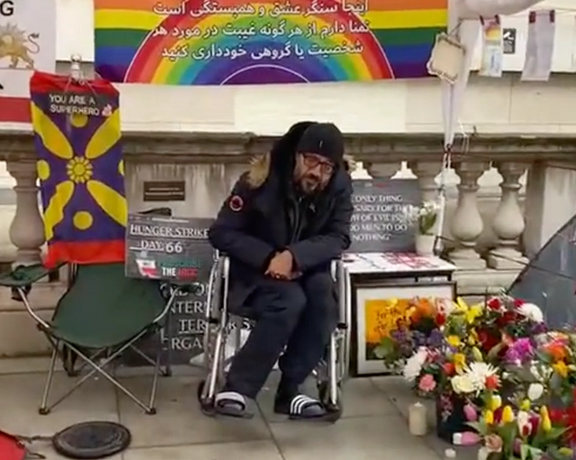
Thousands of Iranians rallied in support of hunger striker Vahid Beheshti across the world and urged the proscription of the IRGC by Britain and other European countries.

Thousands of Iranians rallied in support of hunger striker Vahid Beheshti across the world and urged the proscription of the IRGC by Britain and other European countries.
On Saturday, Iranians living in Vancouver, Canada, in solidarity with Vahid Beheshti and workers' strikes in Iran, called for increased international pressure against the Islamic Republic. Activists living in Montreal also held demonstrations in solidarity with Vahid Beheshti.
Similar events were held in Berlin, Frankfort, Bonn, Kassel in Germany and also Vienna, Gothenburg and Milan.
In France, Iranians held a protest in Paris and emphasized the need to designate the IRGC as a terrorist arm of the Islamic Republic.
Thousands of others marched in London to 10 Dawning Street to ask the UK to proscribe Iran's Revolutionary Guards (IRGC) as a terrorist organization.
The protest rally was attended by activist Vahid Beheshti who has been on a hunger strike in London since February 23 outside the UK Foreign Office to raise awareness for the need to designate the IRGC.
He said he will not back down "even a millimeter from my position" as he risked his well-being for the sake of freedom of speech and human rights.
He said the voice of the huge crowd of Iranians in front of the British Prime Minister's office in London made the UK authorities realize the need to proscribe the IRGC as a terrorist organization.
Several other Iranians have joined Beheshti’s protest action in the past weeks and set up their tents for a sit-in in front of the Foreign Office building.
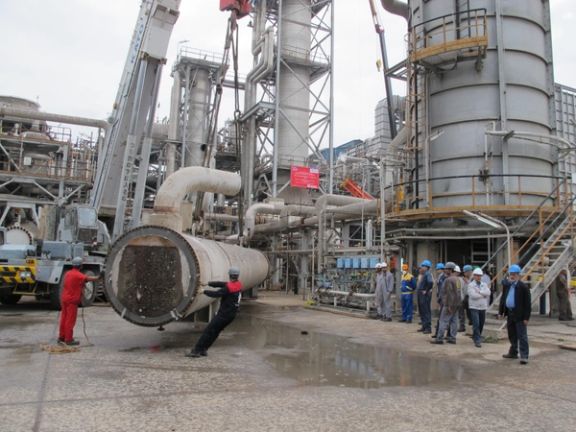
Workers at Razi Petrochemical Complex in the southern port city of Mahshahr stopped working and joined the strike campaign in other energy and steel plants.
Reports on social media say the workers went on strike on Sunday demanding a 79% wage increase for the current year.
The plant began operations in 1968 to produce Ammonia, Urea, Phosphoric Acid, Sulphuric Acid, etc. It is also the largest fertilizer producer in Iran.
In 2020, Ali Akbar Ahmadi Dashti, CEO of the company was arrested on charges of financial corruption and a 330,000 USD embezzlement.
Workers in more than 80 companies, including steel workers, across the country joined industrial action, protesting poor working conditions, low wages and rising costs of living, the Council for Organizing Oil Contract-Workers' Protests said April 25.
On Friday, a regime official said four thousand striking energy workers in the energy and petrochemical sectors are being replaced.
In recent years, as the Iranian National Oil Company has ceded many operations to quasi-private companies, most of the work is done by temporary contract workers with little pay and no benefits.
The so-called private companies are controlled by the military or other state entities, or by well-connected regime insiders who quash labor demands by using government security forces.
Labor activists warn that society is on the verge of explosion as strikes reach expand. Experts say there is no end in sight as tensions rise amidst a crumbling economy and the biggest anti-regime sentiment in years.
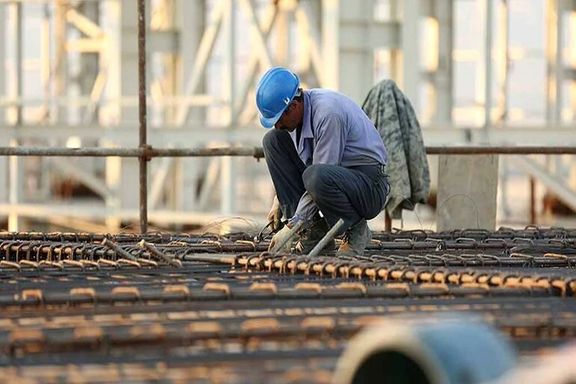
Three prominent Iranian labor activists condemned the recent detention of workers calling it an "organized brutality" by the regime.
Reacting to the recent arrest of a group of labor and union activists, Hassan Saeedi, Keyvan Mohtadi and Reza Shahabi, members of the Workers Syndicate of Tehran and Suburbs Bus Company (Sherkat-e Vahed), who are imprisoned in the notorious Evin prison, slammed the regime's suppression tactics on the eve of May Day, the international labor day.
They said the security agencies, which do not even respect people's privacy, resort to terror instead of dealing with the problems and resolving them.
"Ignorant of the fact that the people are alert, and bullying will not be tolerated by any part of society, [regime repressions] will only lead to more unity among the protesters," they underlined.
They also called on all trade unions, labor, social and political activists, as well as all the freedom seekers not to remain silent in the face of suppression, and to challenge the brutality of the security apparatus by any means possible.
On Friday, a group of labor activists, who went to visit the family of the imprisoned teacher, Mohammad Habibi, were violently attacked by security agents and arrested.
According to the statement, one of the teachers suffered a heart attack and nine others were taken to Evin prison with some in solitary confinement.
In recent days, a new wave of labor strikes have swept the country, with workers from more than 100 companies and plants involved in the protest movement.
An official at South Pars gas field on the Persian Gulf stated that 4,000 protesting workers will be replaced by new ones.
The Islamic Republic has kept accusing the protesting workers of being encouraged by foreign "enemies".
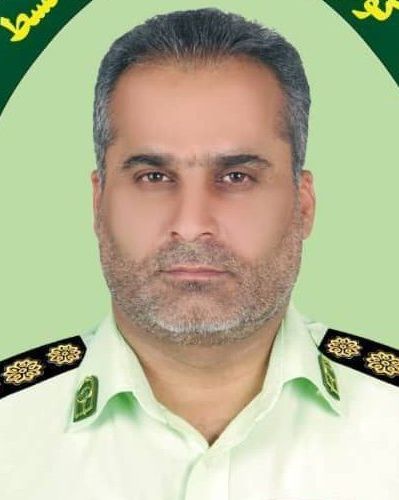
Armed attackers Sunday killed the chief of police Criminal Investigation Department for Saravan County in Iran's Sistan -Baluchistan province.
Nour News, affiliated with the Supreme National Security Council (SNSC), reported that unknown gunmen fired at the car of Major Alireza Shahraki.
The officer's wife was also severely wounded in the attack and taken to hospital in critical condition. Judiciary officials say no one has been detained yet but a manhunt is underway to arrest the perpetrators.
Halvash website that covers Baluchestan events reported that Shahraki used "extremely violent" methods against detainees in the past years.
Earlier in March, two other police officers were gunned down in the restive province with a Sunni-majority population. The attack occurred in a region called Golshan.
Local media identified the two officers as Mohsen Pudinei and Ehsan Shahraki who were shot "while carrying out a security mission regarding Friday prayers".
Last week, tensions built up in Fanuj in the same province after regime forces ran over two motorcycles with their vehicles killing a young man.
The outraged local population took to the streets to protest the actions of the repressive forces in the province. Local media reported that police opened fire at the protesters.
In recent months, pressure on the people in Sistan-Baluchistan has increased, and the situation in various cities has been described as very tense, especially on Fridays, when residents come out to protest against the regime.
The protests began on September 30, 2022, after nationwide unrest broke out following the death of Mahsa Amini.
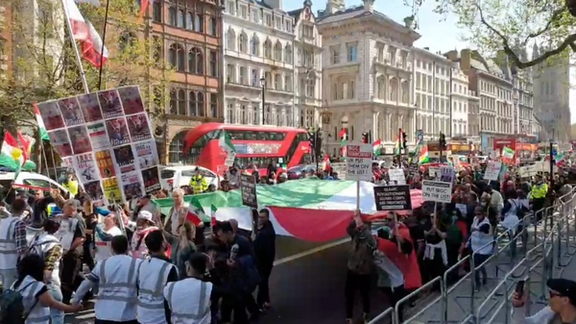
Thousands of Iranians marched in London to 10 Dawning Street Saturday to ask the UK to proscribe Iran's Revolutionary Guards (IRGC) as a terrorist organization.
The protest rally was attended by activist Vahid Beheshti who has been on a hunger strike in London since February 23 outside the UK Foreign Office to raise awareness for the need to designate the IRGC.
In a speech, the 45-year-old Beheshti encouraged the Iranian opposition to foster solidarity. “They managed to strike us with dynamite in the past four months but let’s resume [our unity] from here, from London,” he said referring to the recent disputes among opposition groups and figures.
Activist Hamed Esmaeilion who resigned from the Alliance for Freedom and Democracy in Iranlast week also attended the rally and, in a speech, accused the IRGC of destroying Iran’s economy, environment and the future of all Iranians.
“Stop denying the truth. This evil entity should not have a place in the future of Iran,” he told western governments, including Britain and the European Union that have been cautious to designate the IRGC for fear of further alienating the regime and in turn harm the prospects of negotiations over its nuclear program.
Esmaeilion also urged Beheshti who is now on day 66 of his hunger strike and in a wheelchair to end his action.
Also attending the rally was Alireza Akhondi, a Swedish-Iranian member of the Swedish Parliament who organized a large protest rally in Strasbourg, France, in January to encourage the European Parliament to designate the IRGC as a terrorist organization.
“IRGC’s revolting crimes are evident. It should be put on the list of terrorist groups the same as Da’ish and the Hezbollah of Lebanon,” Shahran Tabari, an Iranian-British journalist, a member of the Labour Party, and an expert on Iran-UK relationship, told the participants in the rally while stressing that the UK’s recent sanctions against the IRGC were “good but insufficient.”
Protesters chanted slogans such as “IRGC is terrorist”, “Down with the child killing regime” and “Down with the Islamic Republic.”
Several other Iranians have joined Beheshti’s protest action in the past weeks and set up their tents for a sit-in in front of the Foreign Office building.
Beheshti met with Tariq Ahmad, Minister of State for the Middle East, North Africa, and South Asia, at the Foreign Office earlier this week and later said they had discussed the UK’s sanctioning of four more IRGC commanders and the importance of proscribing the IRGC as a terrorist organization.
He had also met with the Minister of State for Security, Tom Tugendhat in March and been visited by MPs including Lord Stuart Polak at his tent.
“The Iranian regime is a dead horse. The UK government must not make a bet on a dead horse and should stand beside the people of Iran,” Beheshti’s wife, Coventry city councillor Mattie Heaven, told the rally.
British-Iranian comedian Omid Jalili also spoke at the rally, demanding the IRGC’s designation by the UK government. “The world will then follow suit,” he said.
Several other gatherings were simultaneously held in other European cities Saturday against the Islamic Republic including in Frankfurt, Germany, where Iranian monarchists gathered together upon a call by Iran's exiled Prince Reza Pahlavi and chanted slogans in his support.
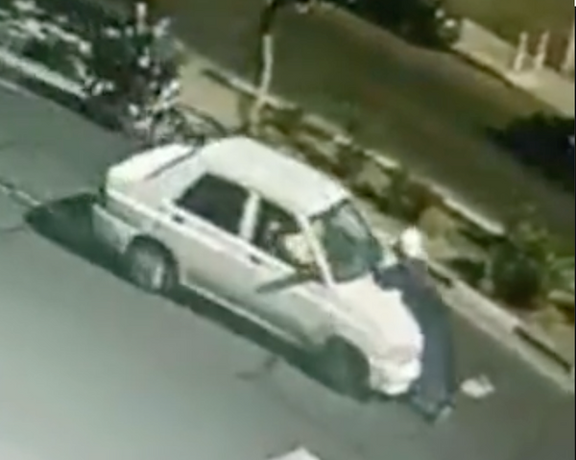
Media close to the Revolutionary Guard say two more clerics were targeted by a driver in the Iranian religious city of Qom after a similar attack on Wednesday.
A vehicle ran over the two clerics injuring them Saturday morning while the driver came out of his vehicle and stabbed one of them, Sabereen News, an Arabic and Persian Telegram channel close to the IRGC Qods Force reported.
The assailant then attacked the police officers and wanted to disarm and take their weapons but was arrested by the agents, added the source.
This is the third attack on clerics within the past few days in Iran. Tehran police on Thursday announced a manhunt was underway to find another driver in the attempted murder of a cleric in the capital.
After parking his car in Marzdaran Boulevard in Tehran at 9 am on Wednesday, the 35-year-old cleric was the victim of a car ramming, police said in a statement.
The culprit fled the scene and the cleric's health status has not been disclosed.
As another sign of rising anger against clerics, a bank guard shot and killed a senior cleric in northern Iran on Wednesday, according to CCTV footage.
Abbas-Ali Soleimani was the most senior clergyman killed in months of unrest that has rocked the country since the death in custody of Mahsa Amini.
In surveillance footage shared widely by Iranian media, the shooter was seen calmly approaching the cleric carrying a firearm, milling around briefly, and then shooting him.
Protesters have been targeting clerics in Iran's latest protests. Since the 1979 revolution, the clergy have gained increasing power, but discontent has risen in recent years, particularly amid waves of protests over economic, political, and civil rights issues.